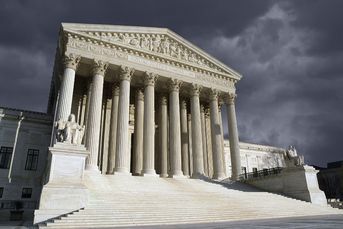BlackRock opens its biggest ETF to proxy voting choice

About half the firm's index equity assets are now eligible for its pilot Voting Choice program.
BlackRock has a Valentine for the 3 million retail shareholders in its $435 billion iShares Core S&P 500 ETF – on Wednesday, it’s giving them a say in how they direct proxy votes.
The company announced that change Tuesday, marking the latest step in its rollout of voting choice programs for fund shareholders. It also represents the first time that BlackRock’s retail customers will have some form of control over how their shares are voted. The program is in a pilot phase that could determine how it will later extend to other funds and retail clients. Last year, the company indicated the program would extend to retail investors for the 2024 proxy season.
So far, institutional clients representing $598 billion have participated in BlackRock’s Voting Choice pilot, according to the company. Those clients are in the minority, as most of the more than $2 trillion in eligible assets have not participated.
With the additional $200 billion in retail client assets now eligible, the amount of investments that can participate in the program totals about $2.6 trillion, representing half of the company’s index equity assets, according to BlackRock.
People who don’t opt for proxy choices will have their shares voted in accordance with BlackRock’s investment stewardship policy. The six choices in proxy voting policies include three from ISS (socially responsible investment, Catholic faith-based, and global board-aligned) and three from Glass Lewis (benchmark, climate, and corporate-governance focused).
“Broadening access to Voting Choice is one way we empower investors by making proxy voting easier and more accessible,” Joud Abdel Majeid, global head of BlackRock Investment Stewardship, said in the company’s announcement. “For clients and shareholders who entrust BlackRock with voting on their behalf, we remain steadfast in our focus on their long-term financial interests.”
Enabling its clients to have some measure of control in proxy voting gives BlackRock a bit of defense against criticism that it has been pushing ESG-themed agendas. The company has become a punching bag for some Republican politicians for its allegedly progressive stances on environmental and social issues, even as it remains one of, if not the, biggest investor in oil and gas in the US. The iShares Core S&P 500 ETF, which is its largest ETF, does not invest according to any ESG criteria.
While company has been vilified on the right, progressives have simultaneously prodded BlackRock to take more action to protect the environment and address climate change.
As the company has come under increasing scrutiny, it has, like other large asset managers, become less likely to support shareholder resolutions. In the past, BlackRock has noted that while its stance on ESG issues hasn’t changed, the nature of resolutions has become increasingly aggressive, making it less likely to vote in favor of them.
Last year, the company voted against 93% of shareholder resolutions focused on climate change or social issues, Andrew Montes, director of digital strategies at As You Sow, said in an email.
“Opening up voting choice to some retail shareholders does not remove BlackRock’s responsibility to hold companies accountable, to engage management on material environmental and social risks, to not simply be a rubber stamp for boards of directors,” Montes said. “BlackRock should ensure that their proxy voting guidelines, which will still be used for the vast majority of votes cast on behalf of BlackRock clients, are aligned with the Paris Climate Agreement and address material environmental and social risks.”
Daily covered-call ETF an ideal portfolio addition, says ProShares strategist
Learn more about reprints and licensing for this article.








